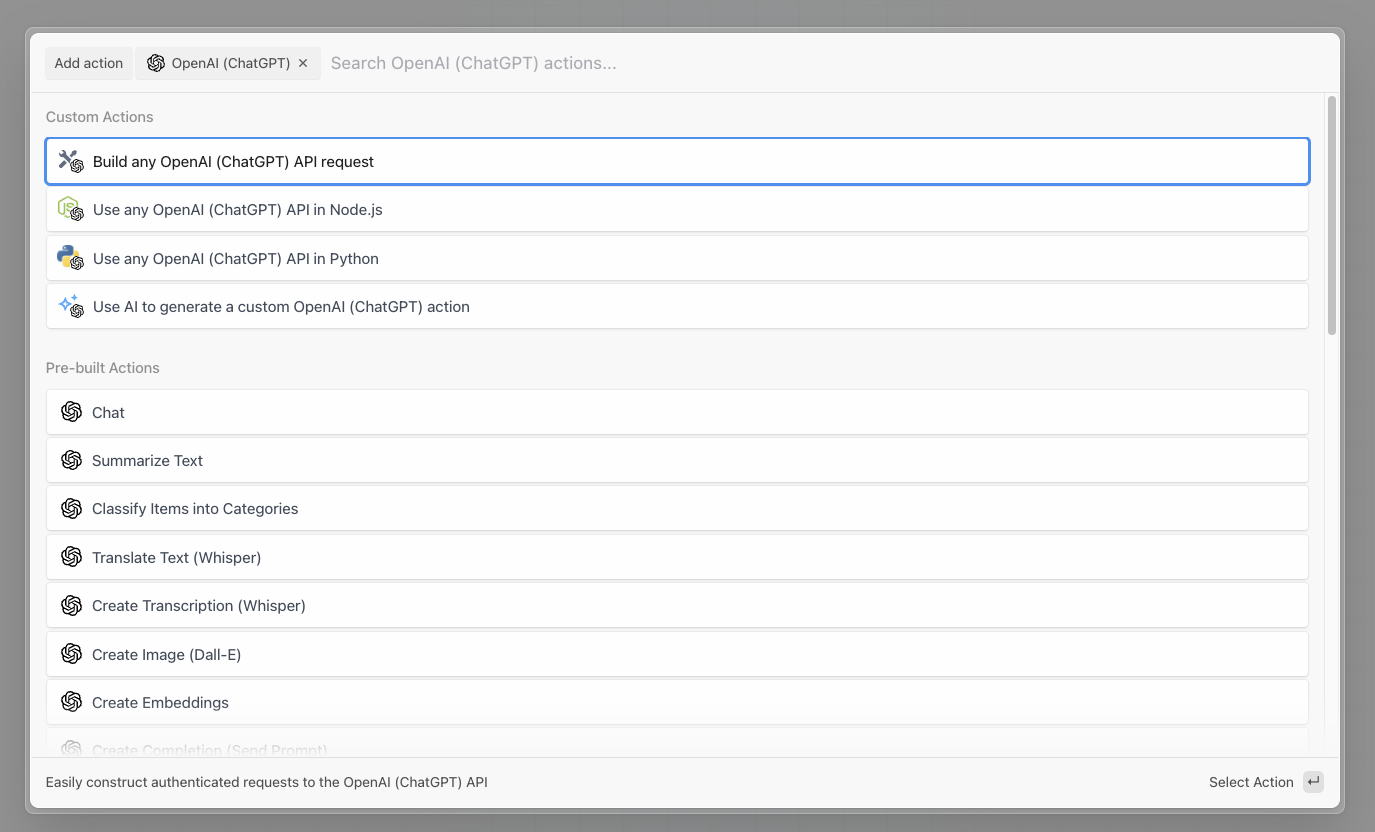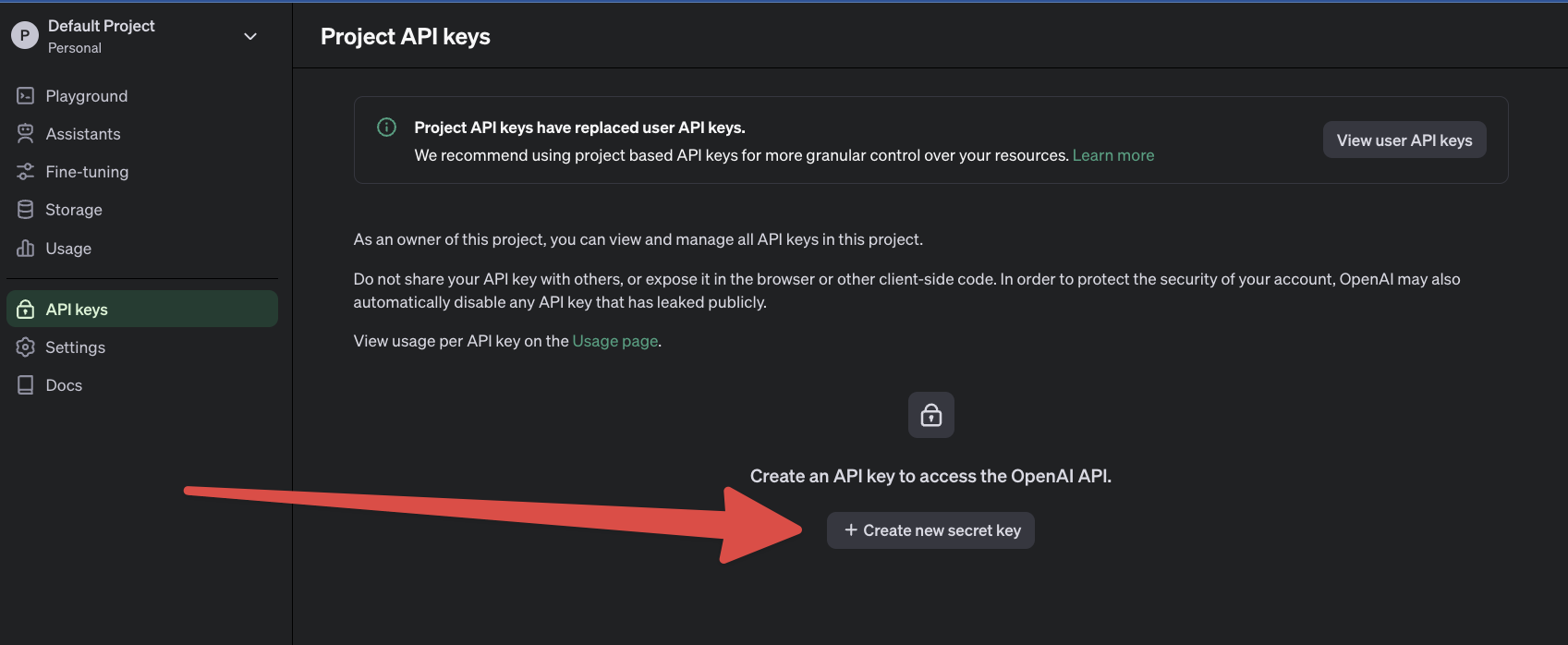What do you want to automate with OpenAI (ChatGPT)?
Prompt, edit and deploy AI agents that connect to OpenAI (ChatGPT) and 3,000+ other apps in seconds.
1-24of3,000+apps by most popular
Trusted by 1,000,000+ developers from startups to Fortune 500 companies
Overview#
OpenAI provides a suite of powerful AI models through its API, enabling developers to integrate advanced natural language processing and generative capabilities into their applications. Here’s an overview of the services offered by OpenAI's API:
- Web search
- Function calling
- Text generation
- Embeddings
- Fine-tuning
- Image Generation
- Vision
- Text-to-Speech
- Speech-to-Text
Use Python or Node.js code to make fully authenticated API requests with your OpenAI account:
import { axios } from "@pipedream/platform"
export default defineComponent({
props: {
openai: {
type: "app",
app: "openai",
}
},
async run({steps, $}) {
return await axios($, {
url: `https://api.openai.com/v1/models`,
headers: {
Authorization: `Bearer ${this.openai.$auth.api_key}`,
},
})
},
})
Example Use Cases#
The OpenAI API can be leveraged in a wide range of business contexts to drive efficiency, enhance customer experiences, and innovate product offerings. Here are some specific business use cases for utilizing the OpenAI API:
AI Agent Tools
Empower your business with AI Agent Tools that act as intelligent, autonomous assistants capable of executing a range of complex tasks.
Customer Support Automation
Significantly reduce response times and free up human agents to tackle more complex issues by automating customer support ticket responses.
Content Creation and Management
Utilize AI to generate high-quality content for blogs, articles, product descriptions, and marketing material.
Personalized Marketing and Advertising
Optimize advertising copy and layouts based on user interaction data with a trained model via the Fine Tuning API.
Language Translation and Localization
Use ChatGPT to translate and localize content across multiple languages, expanding your market reach without the need for extensive translation teams.
Getting Started#
First, sign up for an OpenAI account, then in a new workflow step open the OpenAI app:

Then select one of the Pre-built actions, or choose to use Node.js or Python:

Then connect your OpenAI account to Pipedream. Open the API keys section in the OpenAI dashboard.
Then select Create a new secret key:

Name the key Pipedream and then save the API key within Pipedream. Now you’re all set to use pre-built actions like Chat or use your OpenAI API key directly in Node.js or Python code.
Popular OpenAI (ChatGPT) Integrations#
Popular OpenAI (ChatGPT) Triggers#
Emit new event when a new batch is completed in OpenAI. See the documentation
Emit new event when a new file is created in OpenAI. See the documentation
Emit new event when a new fine-tuning job is created in OpenAI. See the documentation
Emit new event every time a run changes its status. See the documentation
Popular OpenAI (ChatGPT) Actions#
The Chat API, using the gpt-3.5-turbo or gpt-4 model. See the documentation
Chat using the web search tool. See the documentation
Chat with your models and allow them to invoke functions. Optionally, you can build and invoke workflows as functions. See the documentation
Chat with your files knowledge base (vector stores). See the documentation
Summarizes text using the Chat API. See the documentation
Troubleshooting#
401 - Invalid Authentication
Ensure the correct API key and requesting organization are being used.
401 - Incorrect API key provided
Ensure the API key used is correct or generate a new one and then reconnect it to Pipedream.
401 - You must be a member of an organization to use the API
Contact OpenAI to get added to a new organization or ask your organization manager to invite you to an organization
403 - Country, region, or territory not supported
You are accessing the API from an unsupported country, region, or territory.
429 - Rate limit reached for requests
You are sending requests too quickly. Pace your requests. Read the OpenAI Rate limit guide. Use Pipedream Concurrency and Throttling settings to control the frequency of API calls to OpenAI.
429 - You exceeded your current quota, please check your plan and billing details
You have run out of OpenAI credits or hit your maximum monthly spend. Buy more OpenAI credits or learn how to increase your OpenAI account limits
500 - The server had an error while processing your request
Retry your request after a brief wait and contact us if the issue persists. Check the OpenAI status page
503 - The engine is currently overloaded, please try again later
OpenAI’s servers are experiencing high amounts of traffic. Please retry your requests after a brief wait.
Authentication#
Name Slug: openaiOpenAI (ChatGPT) uses API keys for authentication. When you connect your OpenAI (ChatGPT) account, Pipedream securely stores the keys so you can easily authenticate to OpenAI (ChatGPT) APIs in both code and no-code steps.